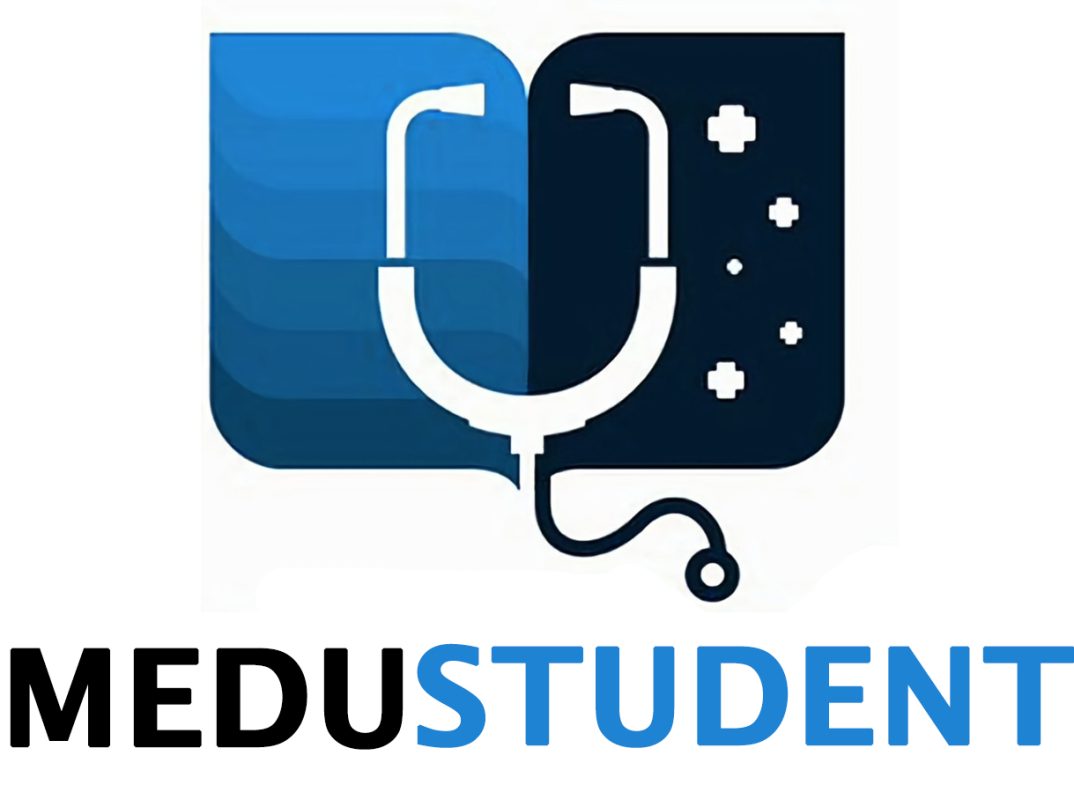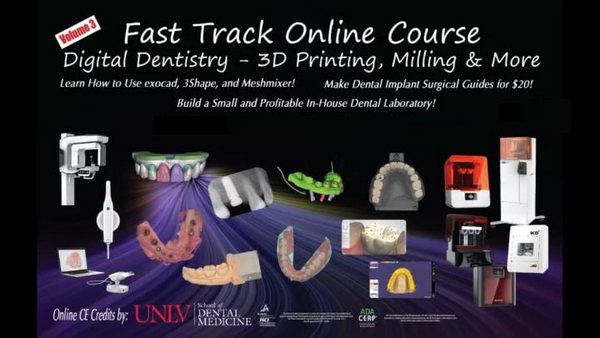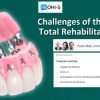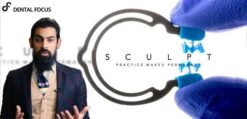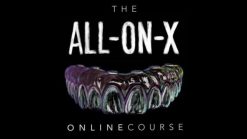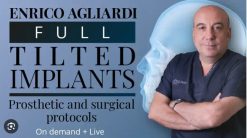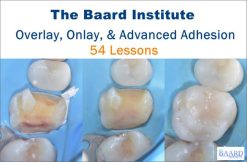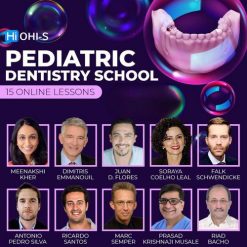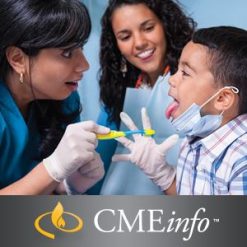Digital Dentistry: Intraoral Scanning, Software, 3D Printing, and Milling
$65,00
Samples for Courses Can be found here : Free Samples Here!
Digital Dentistry: Intraoral Scanning, Software, 3D Printing, and Milling This exciting course covers everything you, your assistants, and your laboratory needs to know about 3D printing and will answer all of your digital questions and address your digital concerns! We cover the basics all the way up to the advanced level methods of using intraoral and optical scanning techniques, free software to edit dental models, 3D printing techniques, and multiple methods for fabricating surgical guides.
Digital Dentistry: Intraoral Scanning, Software, 3D Printing, and Milling
Digital Dentistry
Step-by-Step Digital Dentistry Online Course: Featuring Scanning, Software, 3D Printing, Milling, Implant Surgical Guides, Crowns, Full-Arch Cases!
New Volume 3! In Volume 3, our biggest update yet, we have released incredible new updates on the latest trends in scanning, printing, software, and now… milling!
Are you confused by 3D Printing? Does the thought of being able to go completely digital terrify you? Have you always wanted to make your own surgical guides or crowns? Have you talked to sales reps for dental companies and frustrated by how much it costs to get into printing in your own practice/lab?
This exciting course covers everything you, your assistants, and your laboratory needs to know about 3D printing and will answer all of your digital questions and address your digital concerns! We cover the basics all the way up to the advanced level methods of using intraoral and optical scanning techniques, free software to edit dental models, 3D printing techniques, and multiple methods for fabricating surgical guides. We teach using low-cost, desktop grade 3D printers that cost less than $4,000 for a printer and dental models only cost around $1-2 each and surgical guides $4-5 each! We also teach established workflows using affordable laboratory printing and milling equipment to print and mill occlusal guards and crowns!!
This course utilizes learning skills and educational content that is 10% projection slides and 90% video-based education. We emphasize simulated “LIVE” video based techniques to demonstrate the use of scanners, printers, software, and surgical guide fabrication and demonstration. You will be provided with files containing DICOM and STL files of demonstrated cases for you to follow along. Finally, we provide multiple “cheat-sheet” handouts for you to print in your practice to simplify digital techniques for you and your assistants to best learn all of these technologies!
To receive the best education possible, this course is broken down into 5 sections:
Section I: Fundamentals of 3D Dentistry & Intraoral Optical Scanning
Covering all of the basics of digital dentistry, how to incorporate affordable intraoral scanning techniques and a review of multiple scanners available on the market.
Topics include:
- Historical Overview of 3D Dentistry
- A Review of Scanners on the Market
- Cost Analysis
- Accuracy of Scanners
- Scanning Workflows
- Strategies for Implementing Intraoral Scanning into Clinical Practice
- Clinical Examples Using Scanners
Section II: Using 3D Printers and Free/Open-Source Computer-Aided Design (CAD) Software
Digital Dentistry This section focuses on the basics of using intraoral scans, exporting STL files, the basics of working with the files including modeling and basic smoothing techniques. We walk you through downloading the software, opening STL files, and working with them. Also included is how to set-up the Formlabs, Sprintray, and Nextdent desktop 3D printers, installing cartridges, and getting basic models to print successfully!
Topics include:
- Downloading and Installing Software
- Exporting STL files from an Intraoral Scanner
- Open STL files in Open Source CAD Software Packages
- Basic and Advanced Editing of Dental Models
- Working with Multiple STL Layers
- Exporting Models into STL Files
- Basics of Clay Modeling, Boolean Procedures, Parametric Designs
- Setting up the Formlabs, Sprintray, and Nextdent 3D Printers – Installing Resin Cartridges & Tanks
- Using 3D Printer Software to Print Dental Models
- Understanding Post-Processing Techniques Including Dr. Scherer’s Unique “Contemporary Wash Station Design”
- UV Curing 3D Printed Models: Techniques and Equipment Choices
- Finishing and UV Curing Dental Models
Section III: 3D Printing and Free/Open-Source Computer Aided Design (CAD) Techniques for Restorative Dentistry
Digital Dentistry A comprehensive introduction and in-depth discussion regarding using free software downloaded from the internet to help with basic to advanced restorative dentistry topics. We emphasize using a custom virtual tooth library that you can install into your software for free, using virtual wax-up teeth, wax-up for esthetic restorations, and making clear aligners for missing teeth!
Topics include:
- Digital Restorative Dentistry Basics
- Making 3D Printed Bleaching Trays
- Printing, Fishing, UV Curing Models and Vacuum Forming Trays
- Using Meshmixer to Modify and Virtually Extract Teeth
- Creating a Virtual Tooth Library in Meshmixer
- Intraoral Scanning Denture Teeth
- Create a 3D Printed Temporary Retainer (Essix®) Using a Virtual Tooth Library
- Printing the Temporary Retainer, Finishing and UV Curing the Models, Vacuum Forming, Using Composite Resin to Make Teeth in the Temporary Retainer
- Basic Digital Wax-up Techniques in Meshmixer for Esthetic Dentistry
- Advanced Digital Waxing for Crown & Bridge Dentistry
- Printing Models for Crown & Bridge Dentistry Temporaries, Vacuum Forming Matrix, and Clinical Examples of Digital Crown & Bridge Dentistry
Section IV: 3D Printing for Medical and Dental Modeling
This section is quite exciting and fun at the same time! We cover the basics of CBCT scanning, understanding the role of cheeks and soft tissue separation technique, positioning patients for scanning, performing scans, processing DICOM files, and multiple free or low-cost methods to convert from DICOM to STL files for 3D printing. Finally, we cover amazing new innovations of scanning denture teeth, dental models and other objects with your CBCT scanner to utilize in restorative dentistry and printing techniques!
Topics include:
- Understanding Radiographic Options for Dental Applications
- Using a CBCT Scanner: Understanding Patient Positioning, Voxels, and Field of View
- Soft Tissue Isolation
- Preparing a Patient for a CBCT Scan
- Making a CBCT Scan and Processing DICOM Files
- Converting DICOM to STL: Software Options
- Downloading and Installing Open Source Imaging Software For Converting from DICOM To STL
- Demonstrating Multiple Software Methods for Converting DICOM to STL
- Using Open Source CAD Software to Clean-Up Medical Models Prior to Printing
- Printing Medical Models
- Finishing, UV Curing, and Polishing Medical Models
- Scanning Dental Models with a CBCT Scanner
- Scanning Dentures and Denture Teeth with a CBCT Scanner
Section V: 3D Printing Surgical Guides and Using Blue Sky Plan for Implant Dentistry
Guided implant surgery with 3D printed guides is an amazing way to practice! This exciting section covers everything you will need to get started with 3D printing your own bio-compatible surgical guides in your office for a few dollars instead of hundreds at the laboratory! We cover the basics to advanced concepts and also review actual surgeries and techniques for placing dental implants with guided surgery instruments.
Topics include:
- Fundamentals of Guided Surgery: Background, Terminology, Techniques, Understanding Trajectory and Detph Control During Surgery
- Blue Sky Plan Basics: Importing DICOMs & Essential Planning Technique
- Optical Scanning Options for Fabricating STL Files for Surgical Planning
- Importing Optical Scans and Fusing Onto CBCT Scan for Implant Planning
- Advanced Methods of Model Registration: Matching Teeth, Point by Point, Manual Manipulation Techniques
- Universal Guide Tubes and Surgical Guide Design
- Indirect, Model-Based Surgical Guides
- Printing Models, Fitting Guide Tubes, Vacuum Forming Indirect Guides, Polishing, Clinical Examples of Indirect Surgical Guides
- Changing Resin Tanks & Cartridges for Models vs. Surgical Guides
- Direct, Digital-Based Surgical Guides: Pilot Guide with Blue Sky Bio Drills
- Printing Surgical Guides, Cleaning & Finishing, Fitting Guide Tubes, UV Curing, Clinical Examples of Pilot Guided Surgery
- Direct, Digital-Based Surgical Guides: Fully-Guided Surgical Guides
- Printing Surgical Guides, Cleaning & Finishing, Fitting Guide Tubes, UV Curing, Clinical Examples of Fully-Guided Surgery
Section VI: Advanced Full-Arch Implantology & Surgical Guide Design
Focusing on full-arch implantology, soft tissue supported, guides, partial extraction cases, guide pins, and working with more complex designs than in Section V! We cover the basics of full-arch guides to advanced concepts and demonstrate with video-recorded surgeries and techniques for placing dental implants.
Topics include:
- Fundamentals of Full-Arch Guided Surgery: Background, Terminology, Techniques
- Working with Partially-Edentulous Full-Arch Guides
- Extracting Teeth and Using Partially Tooth Supported/Tissue Supported Guides for Full-Arch Dentistry
- Using “Crown-Down” Treatment Planning
- Working with Guide Stabilization Pins
- Understanding the Role Between Soft-Tissues and Visualizing Soft Tissues on a CBCT
- Radiopaque PVS Impression Technique
- Utilizing Fiduciary Markers and Scan Appliances with CBCT
- Using Intraoral Scanning with Scan Appliances
- CBCT Scanning and PVS Fiduciary Markers
- Impression Inversion Techniques & Fabricating Guides from Inverted Models
- Working with Creative Full-Arch Design
Section VII: Clinical and Laboratory Workflows with 3Shape, Exocad, Printing, and Milling
NEW Section!! This amazing new section is for clinicians that want to get a bit more “serious” with digital! We focus on developing the “in-office combined clinical-laboratory digital practice” and how the role of 3D printing is evolving with milling and how we can produce ceramic restorations, occlusal guards, and many exciting things within our offices! We cover the basics of how to set up laboratory digital equipment to software concepts of 3Shape Dental Systems, exocad, and Blue Sky Plan. We go through the step-by-step clinical and laboratory procedures to make production cases for clinical-laboratory practice success!
Topics include:
- Envisioning the Combined Clinical/Laboratory Hybrid Practice Model
- How Do I Get Started?
- Introduction to Dental CAD Software
- Crown & Bridge Scanning with the Medit i500 and 3Shape TRIOS Scanner
- Designing a Restoration and Models Using 3Shape/exocad Software
- Designing a Restoration and Models Using exocad Software
- 3D Printing Models and Prototyping Restorations – Nextdent 5100, Sprintray Pro
- Milling Monolithic Zirconia Restorations
- Despruing, Sintering, Post-Sintering, Stain and Glazing the Monolithic Zirconia Restoration
- Delivery the Monolithic Zirconia Restoration
- Digital Occlusal Guards – Introduction & Material and Manufacturing Options
- Intraoral Scanning for an Occlusal Guard using the Medit i500 and 3Shape TRIOS Scanner
- Designing an Occlusal Guard using exocad
- Designing Models for the Occlusal Guard using exocad Model Creator and 3Shape Model Builder
- 3D Printing the Occlusal Guard and Models using the Nextdent 5100 and Sprintray Pro 3D Printer
- Milling the Occlusal Guard
- Laboratory Adjustment Procedures of the Milled Occlusal Guard
- Delivering the Occlusal Guard
- Cleaning and Maintaining 3D Printers
- Cleaning and Maintaining the Milling Machine
15 Videos – Duration 50 hours – Files Size: 15 GB
